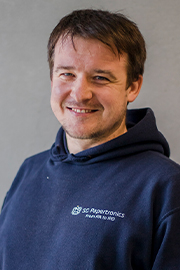In this interview conducted at SLAS EU 2023 in Brussels, Belgium, we spoke to Maciej Grajewski, the Co-Founder and Chief Technology Officer at SG Papertronics, about all things bio-entrepreneurship.
Please can you introduce yourself and tell us what inspired your career in science?
My name is Maciej Grajewski. I studied biotechnology at the Poznan University of Life Sciences and later moved to do a Ph.D. in microfluidics at the University of Groningen. I have been inspired by a lot of the technology dedicated to biological advancements.
You are the Co-Founder and Chief Technology Officer at SG Papertronics. Can you tell us more about SG Papertronics as well as your company's missions and values?
The company was formed during my Ph.D. We were triggered by another wave of new development to popularize point-of-care testing and the dynamic development of paper microfluidics.
We wanted to build a technology incorporating these two aspects to offer people actionable data while not being trained chemists or lab analysts.
We started unusually for a startup, as we went for the craft beer market, which we believe has many proof points for our values. We are thinking about moving to the diagnostic field, including point-of-care diagnostics.
For SLAS EU 2023, you are the track chair for the 'Bio-Entrepreneurship in Europe' educational track. Can you tell us more about your passion for supporting entrepreneurship?
We were motivated by the fact that startups always struggle in many aspects. However, there is an enormous group of people that can help stimulate startups by providing knowledge.
SLAS would like to stimulate this and move a lot of the experience within the community toward startups.

Image Credit: Matej Kastelic/Shutterstock.com
We are hopeful about attracting more startups, entrepreneurs, and new technologies.
Throughout the 'Bio-Entrepreneurship in Europe' track, there are several speakers giving presentations from funding and investment to venture capital funds. Can you talk us through the diversity of speakers in this track and what people can expect to learn from attending some of these talks?
Our track is structured around funding, as innovation cannot be funded without money.
We had three different speakers highlighting exciting perspectives on entrepreneurship in pharma or diagnostics.
Entrepreneurs also discussed how they built innovation, developed their teams, and what they found is needed most for development.
SLAS is an international professional society bringing together life sciences professionals from both academia and industry to accelerate new discoveries. With the life sciences' fast-paced environment, how important is this cross-sector collaboration when bringing about new ideas and partnerships?
These cross-industry collaborations are everything. I would also attach different governmental bodies and authorities, from City Halls to government, to that.
Europe is very diverse, as it has many countries and different ideas on things, making it very difficult to agree and focus on collaboration. It is very dependent on who is leading this kind of work.
I look at things from the entrepreneur's side. You should naturally make it as easy and as painless as possible for entrepreneurs. However, I also understand the risks involved.
I see a lot of will and changes being made in this field. There are very good examples set by some of the exhibitors here - to namedrop a few: Appenders Innovation, AstraZeneca, Ivotech. Some of my speakers are employed at these companies, and they gave really good examples of how you can develop these kinds of collaborations. However, more work is needed to find this entire field in a reasonable place.
Europe is home to 43 of the World's top 100 life sciences universities and also hosts numerous leading life sciences companies. As the CTO of a European company, how important is Europe to the life sciences ecosystem, and what more can be done to support investment to support its development?
Europe is a very important region, but I would not discount any region in the world. Innovation can come from and be supported everywhere. Europe is as important as any other region.

Image Credit: GarryKillian/Shutterstock.com
Why are conferences like SLAS Europe so important in highlighting incredible European life sciences companies? How do these conferences accelerate new partnerships and ideas?
One reason is that they are pinnacles of innovation. People are coming here to show new products and sell their innovations to a knowledgeable crowd. The feedback that you are getting is very valuable from the development, sales, and marketing perspective.
All this information gets the best flow at events like this. I like it mostly because it merges technology, biology, and life science. These are of great personal interest to me.
SLAS also designates a portion of its exhibition floor space for start-ups. What role do start-ups have in the life sciences community, and why is fostering their development in its early years so critical?
People who are attracted to startups are, to an extent, natural risk takers, or they are driven by making impacts or changes. Trying certain innovations via startups is easier, as people move faster and the decision processes are easier.
I think that this is a really nice strength, and it is a kind of liberation from the R&D departments of big companies. Big companies also figure out that certain things are faster and, consequently, cheaper to make via startups with happier people in this high-risk environment.
Startups are needed. I do not think that they are a short-term trend, but we also do not know if we will need startups forever. The market may decide to take a turn, and every big industry company might decide to have its own high-risk startup environment.
Developing technology into life sciences or deep tech, which sometimes merge, takes time. It needs your patience and, of course, a certain amount of capital to make it happen before you prove and validate everything. These are the things that many people who are in technology understand because people are used to, for example, advances in software that you can validate and monetize much faster.
Maciej Grajewski - SLAS Europe 2023
When you are developing something in life sciences, it takes significantly more time. With genetic diseases in the sixties or seventies, everything was very easy to spot and understand. Now, we are providing solutions in a much more complex and intertwined world. It naturally takes more time to solve those problems.
What advice would you offer to a new start-up looking to leverage the European ecosystem to build its business?
Patience and perseverance are needed as an entrepreneur, and other characteristics are very dependent on the startup.
With so many long-standing, prominent life sciences companies already established in Europe, how can a new European company stand out and create its unique market space?
Just create an innovative product. You really need to answer customer needs, and the way to do that can be very random. In our case, I was drinking craft beer and was at a lecture from a craft brewer. How they carried out their testing sparked my interest. Good ideas can come anytime and anywhere. If you find a market for it, there will be a market.
As someone dedicated to supporting new businesses in the life sciences, are there any particular fields you are excited to watch evolve over the coming years? What should people be looking out for?
Point-of-care diagnostics is super interesting, not only because of technology but because, with social acceptance, more is possible.
COVID is a prime example of it. Everybody knows how to make a swab reasonably well and test themselves for COVID.
A second example, which is probably more prevalent at SLAS, is at-line testing of different laboratory processes. You are looking at how to relieve the burden on centralized labs and which kind of tests you can perform at-line very close to the processes that you are running. It is a very quick, dirty method to get yes or no answers or to understand whether you are on the right track. Then you try to correct it somewhere else. This is something that technology facilitates and helps with.
What is next for you? Are you involved in any exciting upcoming projects?
We are preparing for the launch of a product called the Beer-o-meter by SG Papertronics within the next couple of months. SLAS-wise, I am looking into different projects that can help with bio-entrepreneurship, entrepreneurship, and SLAS presence in Europe.
About Maciej Grajewski
Maciej Grajewski, Ph.D., a biotechnologist by training and passion, is co-founder and CTO of SG Papertronics. The start-up is dedicated to exploring the full potential of bioassays. The company's goal is to provide technology that al lows for easy, intuitive and accurate chemical testing. SG Papertronics is currently introducing its technology to the craft beer market as a quality control assistant. Ultimately, the company aims to enable easy and low-cost testing for professionals in other markets, including point of care.
lows for easy, intuitive and accurate chemical testing. SG Papertronics is currently introducing its technology to the craft beer market as a quality control assistant. Ultimately, the company aims to enable easy and low-cost testing for professionals in other markets, including point of care.